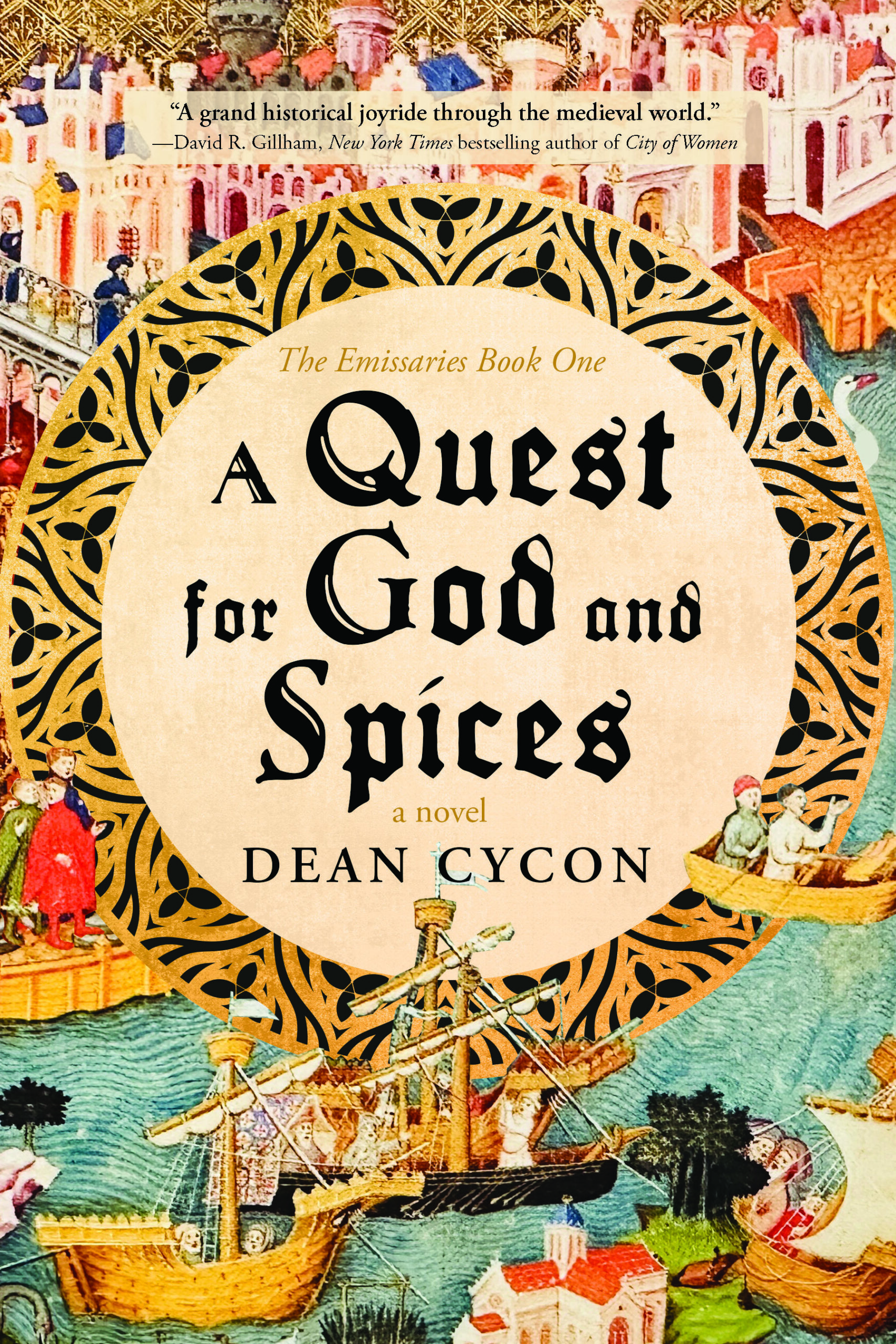
Publisher:
Koehler Books
Publication Date:
01/21/2025
Copyright Date:
N/A
ISBN:
979-8888245156
Binding:
Paperback
U.S. SRP:
22.95
A QUEST FOR GOD AND SPICES
By Dean Cycon


- Posted by IR Staff
- |
Nicolo is a second son in a middling Genoese merchant family. Mauro is a former monk teaching philosophy at the University of Bologna. The Crusades have coagulated into an uneasy peace in which the Latin kingdoms and their Muslim neighbors maintain flexible diplomatic and mercantile arrangements with Christian Europe. Now, at the behest of the pope himself, the two men are impressed into a secret assignment: contact Presbyter John, the fabulously wealthy Christian king reputed to live east of the Muslim empires, and convince him to join forces for a final Crusade.
A QUEST FOR GOD AND SPICES by Dean Cycon portrays this moment of profound historical import—what the text itself describes as “a heady brew of faith, power, politics, and more”—with vivid sensory detail that brings the period sharply into view. Nicolo is keenly attuned to exotic spices like cinnamon and spikenard, their aromas a pleasant contrast with the stink of shambles and tanneries, or the taste of “tart, acidic Sicilian wine.” Mauro’s poverty is rendered in picturesque, informative, and tactile language: “A cheap vellum of deerskin [for writing upon] was all he possessed at the moment, so full of hair it could have been a vest.” The setting overall is successfully shaped by the perspectives of its seafaring, Christian, European characters: a place like Antioch is not just a spot on a map but “a fortified Latin kingdom that [hangs] like a barnacle on the coast of a hostile and unknown Muslim empire.” These moments, combining powerful descriptive language with historical detail, knit together into a strong, flexible narrative fabric.
Overall, GOD AND SPICES convincingly imagines the 12th-century Mediterranean (though in a few places, it also overstays its welcome with exhaustive exposition proving its historical bona fides). However, aficionados of history and historical fiction will nonetheless note a few baffling missteps that seem out of place in this otherwise well-researched work. Curiously, both tomatoes and potatoes appear in the text—famously New World crops, which obviously did not reach Europe before 1492. In one scene, Nicolo professes to believe that “the world [is] shaped like a discus,” something no moderately educated European (and certainly no seafaring Genoese merchant) would have believed in the medieval period. Most alarmingly, the text portrays a chastity belt, dutifully including a scene wherein the key must be stolen to allow for a night of love.
Despite a few poorly attested (and likely metaphorical or satirical) references in the medieval period, scholars overwhelmingly consider the chastity belt to be a fixation of Victorian England; it plays a far greater role in parody of the medieval world than in historically grounded representations. These historical fancies add nothing to the text, and come dangerously close to pulling a reader out of the story entirely—especially in the case of the chastity belt.
This is, in part, because the novel also tacks close to the wind with its overall structure. The setup is rapidly accomplished by some choice conversations with powerful clergymen; the stakes are well-established; and Nicolo and Mauro make an appealing, contrasting duo: the one a hard-nosed merchant’s son, the other an occasionally bumbling philosopher. The text clips along, the pace reinforced by the frequent changes of scene and the introduction (in the second half) of new characters (several of them Muslims). However, there’s also a great deal of unnecessary material, much of which will likely connect to the forthcoming sequel but nevertheless slow the pace and contribute some unnecessary confusion. The clergymen who precipitate the entire story (including the Pope himself) disappear quickly into the background, while new characters (like the child king of Sicily) come and go in the blink of an eye—no matter how interesting or important they appear to be. The historical sect of Assassins is evidently operating alongside the protagonists, but this seems not to affect much of anything in the central narrative. A few bunglingly handled female characters round out this cast of under-served extras—an unfortunate contrast with the well-rounded duo of protagonists.
A QUEST FOR GOD AND SPICES definitely has room for improvement in some of its storytelling and structure fundamentals. Nonetheless, its fast pace, sense of daring, and crisply rendered setting are still worth enjoying, especially for more casual readers.
Dean Cycon’s A QUEST FOR GOD AND SPICES proves a rollicking adventure chock-full of geopolitical intrigue and vivid medieval detail.
~Dan Accardi for IndieReader

Publisher:
Koehler Books
Publication Date:
01/21/2025
Copyright Date:
N/A
ISBN:
979-8888245156
Binding:
Paperback
U.S. SRP:
22.95

- Posted by IR Staff
- |
A QUEST FOR GOD AND SPICES is a lavish historical drama. Drawing on finely detailed historical research, Dean Cynon conjures a heady, vivid portrayal of thirteenth-century Europe in a narrative that foregrounds the complex interplay between its disparate characters, out for money, influence, and authority, and played out against the backdrop of Pope Innocent III’s papacy and the clash between Christianity and the varied cultures to Europe’s east.

A QUEST FOR GOD AND SPICES
Dean Cycon
Koehler Books
979-8888245156
Rated 3.9 / 5 based on 1 review.